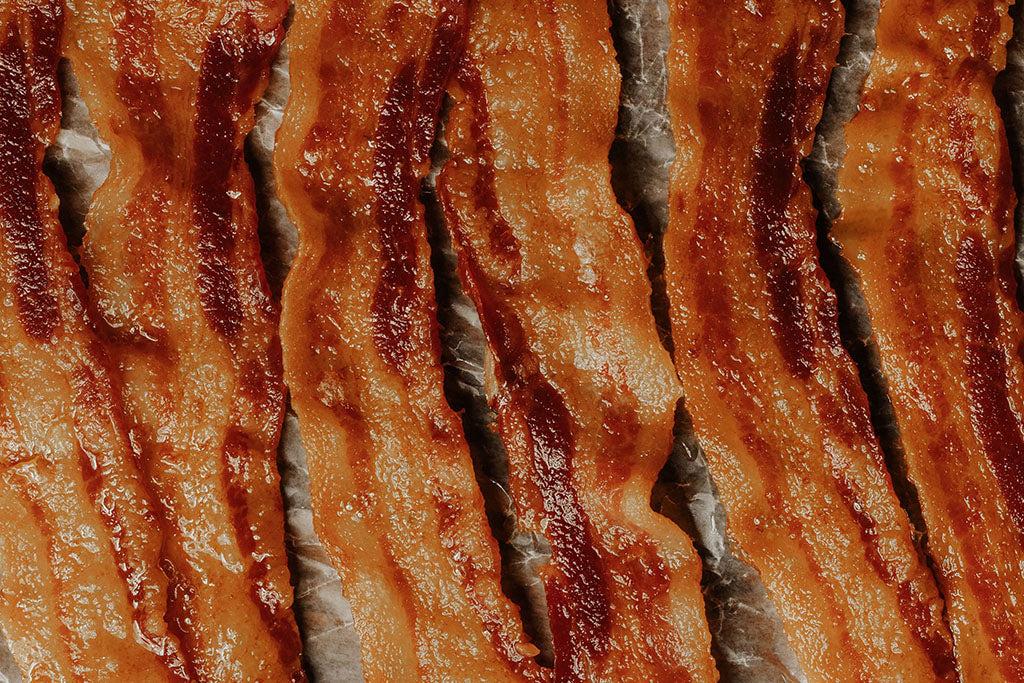In this blog, we learn whether dogs can eat bacon, whether they should if they can, and we’ll also discover if it matters whether the bacon is cooked or raw…
Can Dogs Have Bacon?

Many pups go wild for a sniff of bacon (as do many humans for that matter – the average American eats nearly 18 lbs of bacon per year!). But, just because our pups get equally excited about the smell of cooking rashers, does it mean they should eat bacon…?
Can Dogs Eat Cooked Bacon?
For most healthy dogs, a tiny bit of cooked bacon as a high-value treat can be perfectly safe for them to consume. However, it isn’t advised that bacon makes a regular occurrence in their diet…
This is because bacon is incredibly high in salt and fat which can be detrimental to a dog’s health. Their bodies are far more sensitive to fat and salt than humans are too. When we cook bacon by frying, we often add extra oil to do so which adds to the fat content levels of the bacon as well.
A small piece of bacon fat is okay to give your dog, but again too much can cause gastrointestinal upset and discomfort.
When it comes to bacon grease, this should not be given to a dog, as the levels of fat and oil present in the grease are very likely to upset your dog’s stomach.
If you own a dog with the condition pancreatitis, your dog should never be given bacon or bacon fat, even as a treat as the high-fat content of the bacon can cause a pancreatitis flare.
If your dog has a known pork allergy, they should not be given bacon either as bacon is derived from the body of a pig.
If you do choose to offer your dog a small piece of bacon as a treat (we know those puppy dog eyes can be so hard to resist!), make sure it’s a piece that’s no bigger than your thumb’s nail.

Can Dogs Eat Raw Bacon?
No. Although it’s technically “safe” – as in, there are no known toxins in uncooked bacon – it does pose a higher risk of making them vomit than a small piece of cooked bacon. Raw meat generally carries a higher risk of parasitic contamination than cooked meat does too.
Is Bacon Bad For Dogs?
Bacon is full of saturated fat and cholesterol and although dogs don’t respond to cholesterol in the same way we do, foods that are this high in fat aren’t healthy for a dog in large quantities or in great regularity. These fats will store in the body and eventually cause your dog to become overweight or obese which can be incredibly detrimental to your dog’s long-term wellbeing and overall health.
A high-fat diet in dogs can cause or worsen the condition pancreatitis. Pancreatitis is when the pancreas of a dog becomes inflamed and can range from mild to severe and can either come on suddenly after eating a lot of high-fat food at once, or come on gradually after sustaining a long-term high fat diet. If a dog is diagnosed with pancreatitis, they have to avoid high-fat foods for the rest of their lives in order to preserve their health and comfort. Pancreatitis can be incredibly uncomfortable for a dog to experience.
Bacon is also very high in salt and usually preserved with even more salt (nitrates). Dogs do need a small amount of salt in their diet but too much can cause a dog to feel or be unwell, induce indigestion, and/or cause dehydration.
To add to this, a diet that heavily involves processed meats like bacon have been linked to causing a higher risk of bowel cancer and gastric cancer.

Really, bacon should be viewed as an incredibly special reward for your dog and should only be offered to them in cooked, small treat-sized amounts. For similar reasons, we humans shouldn’t gorge on bacon either to help preserve our health and it should generally be considered a treat food for us too!
If your dog manages to get hold of a packet of bacon, or eats a lot in one go – whether this is cooked bacon or raw – and appears unwell (vomits, experiences diarrhea, or becomes lethargic), do check in with your vet.
Bacon Treats For Dogs
If your dog goes mad for bacon, consider purchasing safe bacon treats for dogs made by a reputable pet brand that can substitute their love for bacon without posing such a high risk to their health!
Can Dogs Eat Turkey Bacon?
Yes, a dog can eat cooked turkey bacon in small quantities. It’s considered a much better offering than pork bacon as it’s high in protein and essential fatty acids. Just make sure that the brand of turkey bacon purchased doesn’t contain seasoning like onion or garlic powders as these are toxic to dogs, and opt for a low-sodium (salt) variety too. However, like regular bacon, turkey bacon should be viewed as a treat food rather than a primary food in your dog’s diet.
What About Other Pork?
Pork in general is safe to give to a dog as long as it’s plain, cooked, and in a small quantity. But, there are better sources of protein for a dog to eat like fish and chicken that are higher in nutritional value, therefore better for your dog to eat and easier for your dog to digest.
There are some foods you should absolutely avoid feeding your dog. Find an extensive list below of food known to be toxic to dogs that you should make sure your dog never consumes:

Sources
Author Dr. Miller, Andrew MRCVS “Can Dogs Eat Bacon?” Pure Pet Food https://www.purepetfood.com/help/can-dogs-eat-bacon
Author Parks, Shoshi “Can My Dog Eat Turkey Bacon? Rover, Oct 01. 2021 https://www.rover.com/blog/can-my-dog-eat-turkey-bacon
 S
S



